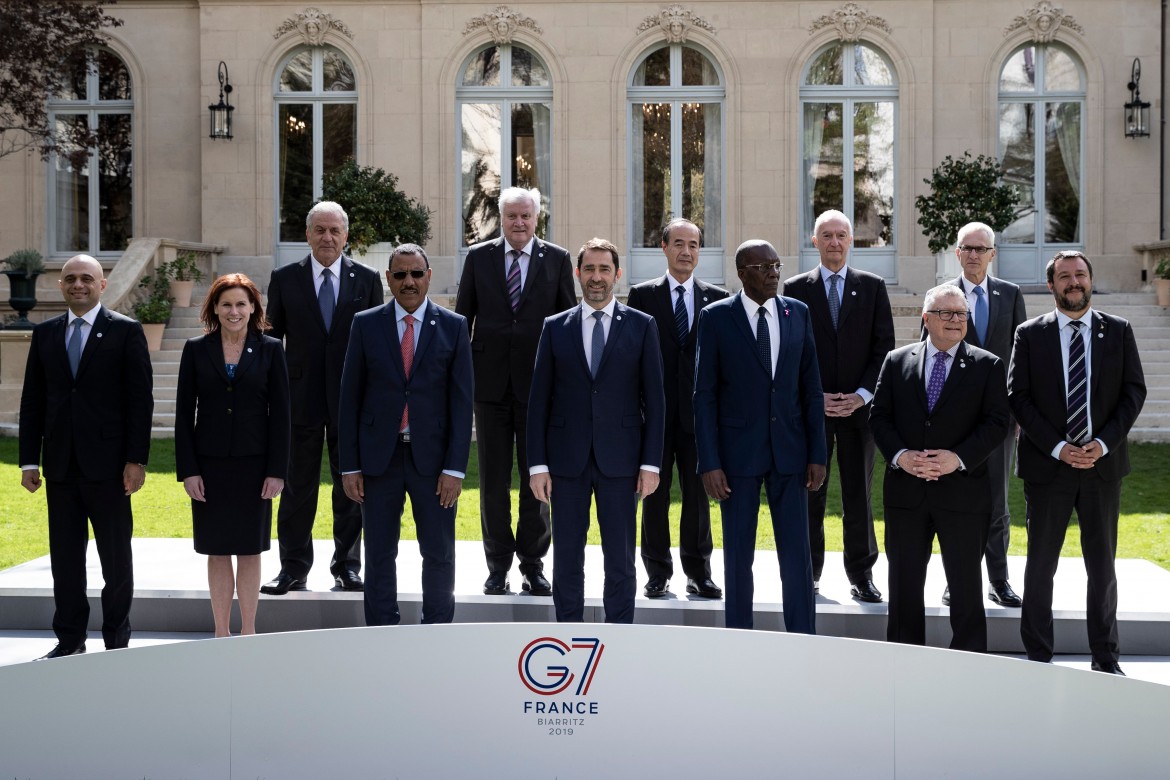Report
Barely functional G7 begins French summit
It’s a difficult moment for international organizations. The G7, after its failure to accomplish anything in Canada last year, will try to reach consensus on such issues as immigration, terrorism, taxation and environmental crime.

The institutional machinery of the G7—now under French leadership—sprang into action on Thursday, with a first meeting of the Ministers of the Interior in Paris, set to continue on Friday in parallel with a meeting of the Foreign Ministers in Dinard, Brittany, in preparation for the full G7 summit in Biarritz on August 24-26.
The unstructured institution of the G7, established in 1975 at the initiative of French President Valéry Giscard d’Estaing, is in trouble, being “more a club of former fighters of the old world than of fighters of the new one,” according to Bertrand Badie, an expert on international politics, and for good reason: at this point, the G20, which brings together the world’s leading economies, including China, India and Russia (the latter excluded from the G8 in 2014 because of the annexation of Crimea), has established its own central importance.
The last G7 meeting, held in Canada in 2018, ended with a resounding failure: while on the plane back to the US, Donald Trump disavowed his signature of the final statement. Today, the US, distracted by other issues, did not send Secretary of State Mike Pompeo to Dinard, but instead his second-in-command, John Sullivan. (Pompeo, meanwhile, has formally requested that France cancel the taxes it just decided to impose on the revenues of Google, Amazon, Facebook, Apple and Microsoft—companies that were also invited to Paris, together with Twitter, to have discussions with the Ministers of the Interior regarding measures to block the links between terrorism and the online world.)
The UK is currently mired in Brexit. Germany is facing its own troubles regarding its transition from Angela Merkel to a governing vision that would be more towards the right of the CDU-CSU, and the Franco-German agreements have been put in difficulty by the request made by the new CDU leader, Annegret Kramp-Karrenbauer, for France to give up its seat on the UN Security Council in order to share it with the EU. Justin Trudeau has lost his luster in Canada, and Italy’s populists are clashing with their European partners.
Matteo Salvini arrived in Paris trumpeting his gross oversimplifications as “truths”—namely, that “you cannot leave the management of immigration to private organizations,” such as the NGOs that the Lega has been targeting, an argument based on Salvini’s fallacious lumping of all “private” actors (human traffickers and NGOs) into the same category, so that he can accuse all of them together of making “profits that are converted into weapons and drugs.” On these flimsy grounds, he claims that “the link between immigration and terrorism has been proven.”
The meeting of the Ministers of the Interior also included those from Nigeria and Burkina Faso, Mohamed Bazoum and Ousséni Compaoré, two countries that are leaders of the G5 Sahel, as France wants to have Africa as a partner at the 2019 G7. Salvini saw this as the perfect opportunity to propose making both aid and trade deals “conditional” on the Africans’ cooperation “on the control of departures and repatriations” of migrants.
On Thursday evening, the dinner of the Ministers of the Interior at the Palais de la Légion d’Honneur, which was also attended by the French Justice Minister, Nicole Belloubet, was devoted first of all to a discussion on how to address the issue of foreign jihadists arrested in Syria or Iraq who are citizens of the countries of the G7. France and the US gave very different answers: Paris wants each case to be judged in the country of capture, after which an eventual repatriation would be decided “on a case by case basis” (something that is already underway for women and children), while in the opinion of the US, in order to avoid the risk that possible terrorists could fall through the cracks, each country should take charge of its own citizens and put them on trial in its courts.
After the terrorist attack in Christchurch, New Zealand, the social networks are under fire for the first-person videos of the violence which spread successfully through Facebook, a company that was a particular target for the ministers’ requests for cooperation—although, according to the Europeans, the US model of working together with the major Internet companies has shown its limits. Germany, France and the UK have also asked the EU Commission to propose legislation that would allow the immediate suppression of content that includes incitements to terrorism.
Environmental crime was also on the agenda, which is now the third most lucrative type of criminal activity in the world according to Interpol, generating revenues of $200 billion per year.
Originally published at https://ilmanifesto.it/g7-la-ricerca-di-cooperazione-sul-terrorismo/ on 2019-04-05
